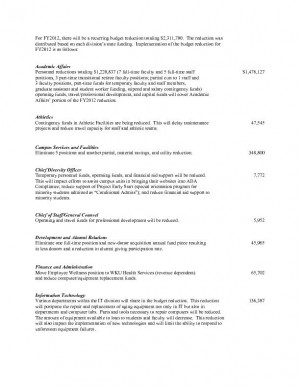Ransdell says 5 percent tuition hike likely on the way

March 22, 2011
The $2.3 million in budget cuts for fiscal year 2011-2012 that President Gary Ransdell announced on Friday will come at a price for students.
Ransdell outlined how the cuts would be broken down across departments in an email to faculty and staff at the end of last week, adding that students would be faced with higher tuition next year.
The Board of Regents raised tuition 5 percent for in-state students and 5.9 percent for out-of-state students in June 2010.
Ransdell said universities across the state have seen between a 5 and 10 percent tuition increase each year over the last few years.
He said WKU is expected to raise tuition by about 5 percent for this fall.
“It may be a percent higher or a percent lower, but it won’t deviate from that very much,” Ransdell said. “I think that will be consistent across institutes of higher education in Kentucky.”
Ransdell said every division on campus would share the “difficult reductions.”
“Our immediate challenge is how to most prudently reduce spending by $2.3 million while sustaining as little negative impact as possible on our faculty, staff, and students,” Ransdell said. “… How divisions choose to make the required cuts is entirely up to those who lead their respective decisions.”
The cuts most significantly impact Academic Affairs.
That division will see a $1.4 million reduction and lose 12 full-time faculty and staff positions.
Campus Services and Facilities will see the second-largest reduction at $348,800, with another five full-time positions removed. Information Technology is being cut $136,387.
No other division suffered more than $100,000 in cuts.
On June 30, the federal stimulus funds that WKU and other colleges and universities across the state had been receiving through the American Recovery and Reinvestment Act of 2009 will expire.
WKU has been more fortunate than other universities that are facing budget reductions during tough economic times, said Ann Mead, vice president for Finance and Administration.
“Some universities must decrease costs by so much that I don’t see how they’re still open,” Mead said in February.
In total, $97.4 billion in stimulus money was awarded from the Recovery Act to educators across the country, according to ed.gov.
WKU received a total of $5.4 million in stimulus funds through the act, Mead said.
Budget reductions of between $1.6 million and $2 million are common for WKU, she said.
There have also been years where the university budget has been reduced by more than $4 million, she said.
Ransdell said WKU’s highest priority is trying to figure out how to make the reductions in each division while impacting as few of the WKU community as possible.
“The global recession has affected all aspects of our local, regional, state, and national economies,” he said. “But as bad as it has impacted us at WKU, I must also acknowledge that our total impact over this period of time has not been as bad as most other states and many other public universities.”














